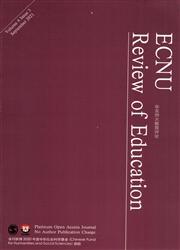幼儿教师的道德准则:我们如何以及为什么应该使用它们
IF 2.6
Q1 EDUCATION & EDUCATIONAL RESEARCH
引用次数: 0
摘要
在世界范围内,幼儿教师被认为在改善儿童的日常生活和加强他们的学习能力方面发挥着至关重要的作用。因此,阐明教育实践的专业标准正日益受到利益相关者(包括政府、教育当局和家长)和幼儿教师本身的关注(Campbell-Barr & bogatiki, 2017;Chen et al., 2016;没有,2018;Hordern, 2016;Oberhuemer, 2005)。然而,尽管长期以来人们都认为儿童教育是一项基于教师的价值观、动机和责任的伦理任务(Afdal & Afdal, 2019;坎贝尔,2008;Chen et al., 2016;福斯特,2012;韦伯斯特和惠伦,2019a),目前关于专业实践标准的讨论似乎忽视了道德方面(马龙,2020)。此外,尽管公众对教师在幼儿教育和护理(ECEC)中的作用的兴趣和期望越来越大,但该专业仍在努力实现专业地位(Havnes, 2018,第659页;Oberhuemer, 2005)。本文章由计算机程序翻译,如有差异,请以英文原文为准。
Ethical Codes for Early Childhood Teachers: How and Why Should We Use Them
Around the world, early childhood teachers are recognized as playing a crucial role in improving children’s everyday lives and strengthening their learning abilities. Consequently, explicating the professional standards of educational practice is receiving growing attention from both stakeholders— including governments, educational authorities, and parents—and early childhood teachers themselves (Campbell-Barr &Bogatić, 2017; Chen et al., 2016; Havnes, 2018; Hordern, 2016; Oberhuemer, 2005). However, despite the long recognition of children’s education as an ethical task based on the values, motivation, and responsibility of teachers (Afdal & Afdal, 2019; Campbell, 2008; Chen et al., 2016; Forster, 2012; Webster & Whelen, 2019a), current discussions of standards for professional practice appear to neglect ethical aspects (Malone, 2020). Moreover, despite growing public interest in and expectations of the role of teachers in early childhood education and care (ECEC), the profession is still struggling to achieve professional status (Havnes, 2018, p. 659; Oberhuemer, 2005).
求助全文
通过发布文献求助,成功后即可免费获取论文全文。
去求助
来源期刊

ECNU Review of Education
Social Sciences-Education
CiteScore
4.90
自引率
0.00%
发文量
41
审稿时长
10 weeks
 求助内容:
求助内容: 应助结果提醒方式:
应助结果提醒方式:


